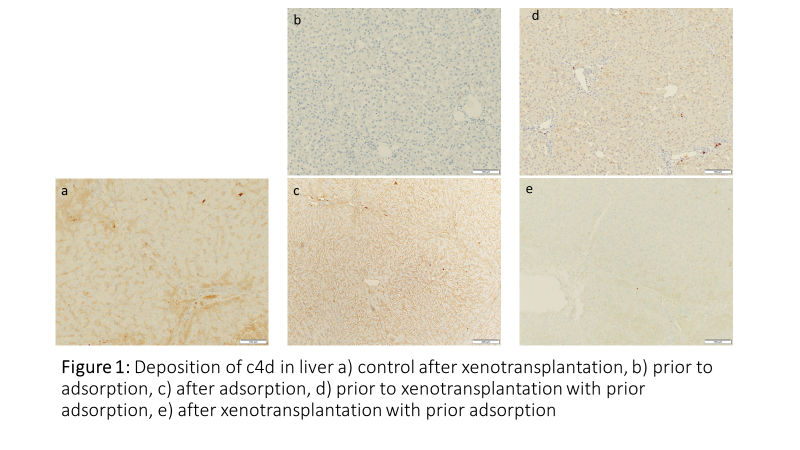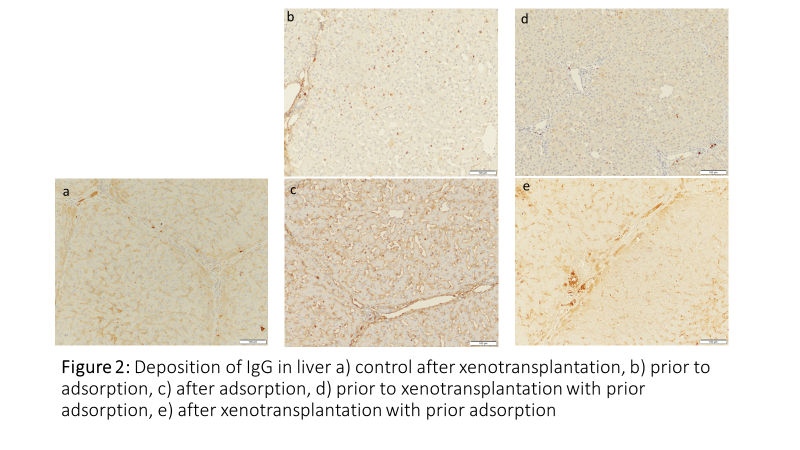Pre-Transplantation Liver Immunoadsorption Reduces Liver-Specific Antibody and Complement Deposition without Prolonging Survival in Porcine to Baboon Liver Xenotransplantation
1Massachusetts General Hospital/Harvard Medical School, Boston, MA, 2eGenesis, Inc, Cambridge, MA
Meeting: 2022 American Transplant Congress
Abstract number: 1533
Keywords: Immunoadsorption, Liver, Surgery, Xenoreactive antibodies
Topic: Basic Science » Basic Science » 13 - Xenotransplantation
Session Information
Session Time: 7:00pm-8:00pm
 Presentation Time: 7:00pm-8:00pm
Presentation Time: 7:00pm-8:00pm
Location: Hynes Halls C & D
*Purpose: Triple knock-out pigs lacking GGTA1, β4GALNT2, CMAH genes are hypothesized to be the optimal donor for human xenotransplantation, however there is evidence that TKO may reveal tertiary antigens to which nonhuman primates (NHP) react strongly. Here, we explore the use of liver immunoadsorption to deplete complement and liver-specific preformed antibodies prior to liver xenotransplantation.
*Methods: NHPs were screened for low titer levels of IgM and IgG to TKO porcine endothelial cells (pAEC) prior to selection for transplantation. Two NHPs underwent transplantation directly (control). Three NHPs underwent liver immunoadsorption prior to transplantation (adsorption). Tissue was collected from the liver xenografts prior to adsorption, after use in adsorption, prior to transplant and at necropsy. Baseline, pre-adsorption, post-adsorption, pre-transplantation and necropsy serum was collected.
*Results: Liver xenotransplantation results in significant deposition of c4d (Figure 1a) and IgG (Figure 2a). Similar deposition was seen in the liver utilized for immunoadsorption (Figure 1b/c, Figure 2b/c). Those animals with prior immunoadsorption have significantly less c4d and IgG deposition in the liver xenograft (Figure 1d/e, Figure 2d/e). Liver adsorption resulted in a 63% & 50% mean decrease in IgG and IgM post-adsorption respectively. Comparing pre-transplant to necropsy, the IgG levels of animals which underwent adsorption decreased less than the control animals (38% vs 88%, p=0.017). Mean post-transplantation survival was 15 hours in the adsorption group and 13 hours in the control group.
*Conclusions: Liver immunoadsorption results in significant and sustained depletion of complement and liver-specific IgG prior to transplant. However, there is no apparent difference in NHP survival, suggesting that complement activation and anti-TKO antibodies in low-titer animals may not contribute significantly to xenograft failure.
To cite this abstract in AMA style:
Cloonan DJ, Coe T, Serifis N, Matheson R, Maggipinto S, Firl D, Anand R, Layer J, Queiroz L, Stiede K, Hall K, Youd M, Qin W, Curtis M, Kimura S, Rosales I, Markmann J. Pre-Transplantation Liver Immunoadsorption Reduces Liver-Specific Antibody and Complement Deposition without Prolonging Survival in Porcine to Baboon Liver Xenotransplantation [abstract]. Am J Transplant. 2022; 22 (suppl 3). https://atcmeetingabstracts.com/abstract/pre-transplantation-liver-immunoadsorption-reduces-liver-specific-antibody-and-complement-deposition-without-prolonging-survival-in-porcine-to-baboon-liver-xenotransplantation/. Accessed February 26, 2026.« Back to 2022 American Transplant Congress


